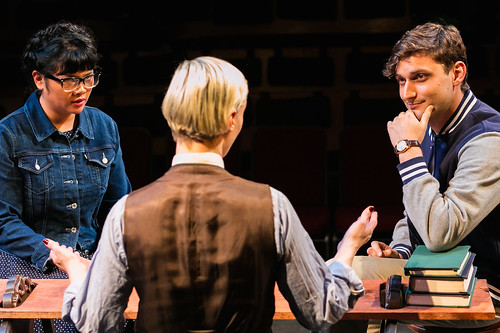
El Beh as Emily and Joshua Schell as George share strawberry ice cream sundaes in the Shotgun Players production of Our Town by Thornton Wilder. Below: Sam Jackson as Mrs. Soames loves a good Grover’s Corners wedding. Photos by Cheshire Isaacs
When it comes to the rituals of the New Year – making and abandoning resolutions, vowing to live more fully and with intention, trying not to let time slip away so quickly by living more fully in the present – the most powerful thing you could do for yourself is head over to the Ashby Stage in Berkeley and see Shotgun Players’ excellent production of Thornton Wilder’s Our Town.
This 1938 masterpiece has long been my favorite American play, and aside from its structural genius, its Expressionistic (and still unmatched) theatricality balanced with genuine emotion, Our Town is the self-help book embedded in our nation’s consciousness. I’ve seen the play dozens of times in straightforward productions (like Shotgun’s) and over-produced and over-thought re-imaginings, in musical and film versions, in schools and on the professional stage, and every time I come away with something new. More than any other, I feel Our Town in other works when they succeed in connecting audience to play or when they tap into simple truths that need constant reiteration about what the hell we’re even doing on this planet.
If I could start every new year with a production of Our Town as engaging and as powerful as director Susannah Martin’s, I would gladly do so. The holidays, and especially New Year’s, are a time when we’re prone to being more thoughtful and retrospective anyway, so we’re already primed for Wilder’s musing on time, memory and cracking the shell of what we know as everyday life. Walking into the Ashby Stage (a former church whose pews have become increasingly more comfortably in Shotgun’s tenure there) at this time of year, we’re ready for Wilder to bring it all on: the prosaic, the nostalgic, the poetic, the awesome, the mind-blowing, the heart-wrenching – all the malleable gunk that joins each moment of our lives to another and to each other.
In some ways, with this play, you need to set it up, let it go and get out of the way. Martin, her designers and cast, do that with their own smart, deeply felt choices. The performance space itself, as designed by Nina Ball, has a huge impact on the play before it even starts. Where there’s usually a stage there are now audience members. The stage where the actors do their work is now more in the center of the room, although in another canny move, actors spend a lot of time sitting in and moving through the audience. There’s very little division between audience and play, which is just as it should be.
Ball and lighting designer Heather Basarab dangle bare bulbs the length of the entire theater, casting a warm glow and making the audience quite visible for much of the play. If part of the play’s effect is creating a sense of community in a vast universe, Martin and her crew do a beautiful job of allowing that to happen.
Madeline H.D. Brown strikes a match and lights her pipe as she begins, in her role as Stage Manager, to tell us all about Grover’s Corners in 1901. She’s a wise and trustworthy guide through this case study of small-town American life as microcosm for human existence. There’s no phony New England crust to her, which is a relief, but she retains a healthy sense of detachment and humor.
That no-nonsense attitude filters down through the entire cast. Tim Kniffin makes an especially strong impression as a thoughtful Doc Gibbs. In a scene where he chides son George (Josh Schell) for not helping his mother more, Kniffin turns a scolding into something much more emotional between father and son. It’s a powerful moment when George’s ego gets its first check – he gets another ego smackdown from neighbor Emily Webb (El Beh) that is so effective he marries her.
Hardworking mothers (Michelle Talagarow as Mrs. Webb and Molly Noble as Mrs. Gibbs) keep the world spinning, choir practice keeps the gossip flowing (especially when the topic is the tippling of Simon Stimson (Christopher W. White,one of those suffering souls not meant for small-town life) and weddings and funerals keep the community tightly knit. In other words, it’s all pretty ordinary in extraordinary ways, and then, in Act 3, one of the most wondrous pieces of writing in American drama, Wilder takes a leap of imagination that remains staggering in its effect. Everything he has done in the play up to this point comes into play and brings everything together. We go from mundane to cosmic in an instant and never go back.
In three acts over 2 1/2 hours, this Our Town never lags and never panders. It’s sharp at some points, poignant in others, devastating and inspiring. It’s filled with the friction of warm memory crashing into harsh reality, made all the more powerful under the light of the stars.
FOR MORE INFORMATION
Thornton Wilder’s Our Town continues through Jan. 25 in a Shotgun Players production at The Ashby Stage, 1901 Ashby St., Berkeley. Tickets are $20-$30. Call 510-841-6500 or visit www.shotgunplayers.org.


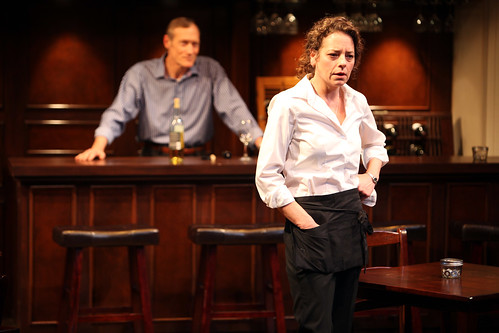
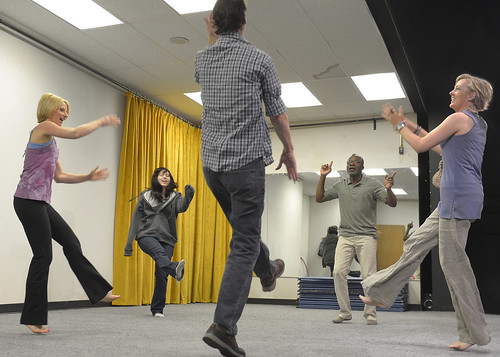
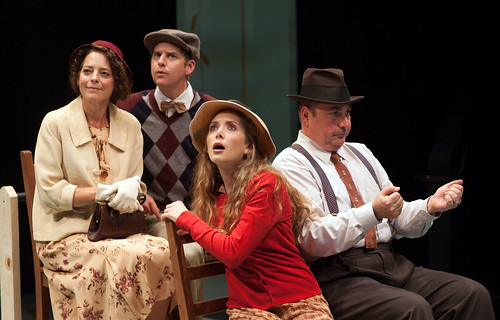

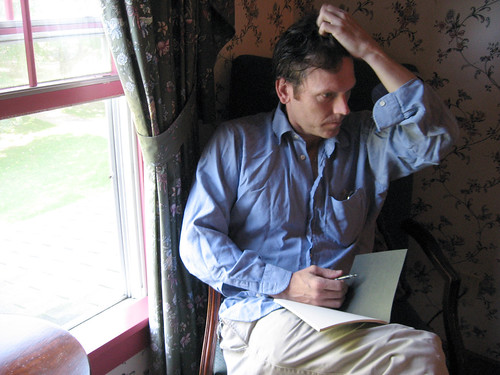
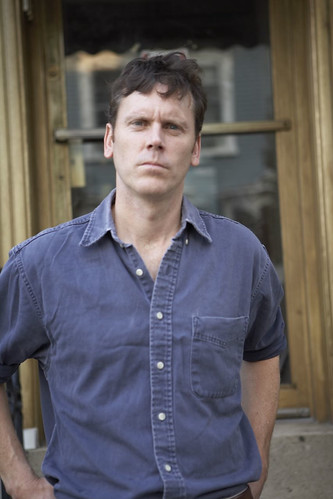

 There’s a scene of WALL-E trying to dance with a hubcap for a hat that is priceless. But that’s just a prelude to the robot’s actual chance to fall in love with EVE, a slick droid sent down from the mother ship (where all the too-fat humans are carried on floating chairs, eyes glued to the screens in front of their faces). Neither of the ‘bots really speaks, so the true expression of their feelings (again, why these robots have developed feelings is mysterious, but intriguing) is by touching, or holding hands, just like Irene and Cornelius do in Hello, Dolly!
There’s a scene of WALL-E trying to dance with a hubcap for a hat that is priceless. But that’s just a prelude to the robot’s actual chance to fall in love with EVE, a slick droid sent down from the mother ship (where all the too-fat humans are carried on floating chairs, eyes glued to the screens in front of their faces). Neither of the ‘bots really speaks, so the true expression of their feelings (again, why these robots have developed feelings is mysterious, but intriguing) is by touching, or holding hands, just like Irene and Cornelius do in Hello, Dolly!
 And Herman, whose music is so integral to one of the best movies of the year (animated or otherwise), is getting the kind of exposure he deserves. He told the Associated Press: “I’m still blown away by the fact that two songs of mine that are close to 50 years old have been used as the underpinning of the movie.”
And Herman, whose music is so integral to one of the best movies of the year (animated or otherwise), is getting the kind of exposure he deserves. He told the Associated Press: “I’m still blown away by the fact that two songs of mine that are close to 50 years old have been used as the underpinning of the movie.”
 Greatest guilty pleasure: Legally Blonde, The Musical, had its pre-Broadway run early in 2007 at San Francisco’s Golden Gate Theatre, and though it had its problems, it was a heck of a lot of fun. The best number was the lengthy “What You Want” in which sorority gal Elle Woods (Laura Bell Bundy) decides to apply to Harvard. In true musical fashion, the number sweeps through time and space, coursing through months of effort and from Southern California to the hallowed halls of Harvard. Jerry Mitchell’s choreography incorporates a frat party, the Harvard selection committee and a marching band.
Greatest guilty pleasure: Legally Blonde, The Musical, had its pre-Broadway run early in 2007 at San Francisco’s Golden Gate Theatre, and though it had its problems, it was a heck of a lot of fun. The best number was the lengthy “What You Want” in which sorority gal Elle Woods (Laura Bell Bundy) decides to apply to Harvard. In true musical fashion, the number sweeps through time and space, coursing through months of effort and from Southern California to the hallowed halls of Harvard. Jerry Mitchell’s choreography incorporates a frat party, the Harvard selection committee and a marching band. Speaking of MacDougall: It was a good year for the actress (seen at right with the fur and tiara), who died memorably in Cal Shakes’ King Lear and ended 2007 with a superb, hip-swiveling, lip-pursing performance in Sex by Mae West at the Aurora.
Speaking of MacDougall: It was a good year for the actress (seen at right with the fur and tiara), who died memorably in Cal Shakes’ King Lear and ended 2007 with a superb, hip-swiveling, lip-pursing performance in Sex by Mae West at the Aurora. Best ensemble: Behind every good show is a good ensemble, in front of and behind the scenes. But the one that comes to mind that, together, elevated the play was the fine crew in TheatreWorks’ Theophilus North (left) directed by Leslie Martinson.
Best ensemble: Behind every good show is a good ensemble, in front of and behind the scenes. But the one that comes to mind that, together, elevated the play was the fine crew in TheatreWorks’ Theophilus North (left) directed by Leslie Martinson. Favorite quote of the year: It was uttered by the food critic Anton Ego (and written by Brad Bird) in the brilliant Pixar/Disney movie Ratatouille. As a critic (or what’s left of one), the words really hit home. And they’re true.
Favorite quote of the year: It was uttered by the food critic Anton Ego (and written by Brad Bird) in the brilliant Pixar/Disney movie Ratatouille. As a critic (or what’s left of one), the words really hit home. And they’re true.


 “I started to read the book and was dumbfounded,” Burnett says from his New York City home. “It became apparent to me within 30 pages that this novel would be a great play. It just had to be a play. At that point I was thinking about it as an actor. I was Theophilus. I figured I’d write the play for myself.”
“I started to read the book and was dumbfounded,” Burnett says from his New York City home. “It became apparent to me within 30 pages that this novel would be a great play. It just had to be a play. At that point I was thinking about it as an actor. I was Theophilus. I figured I’d write the play for myself.” For several years, in between acting gigs, Burnett would sit on the roof of his Brooklyn building and turn Theophilus North from a nearly 400-page novel into a two-hour play.
For several years, in between acting gigs, Burnett would sit on the roof of his Brooklyn building and turn Theophilus North from a nearly 400-page novel into a two-hour play. “There’s a section in the novel in which Wilder says Theophilus wanted to be surrounded by a constellation, but that this desire had nothing to do with romantic love or love of family.
“There’s a section in the novel in which Wilder says Theophilus wanted to be surrounded by a constellation, but that this desire had nothing to do with romantic love or love of family. In July comes the West Coast premiere of Theophilus North, Matthew Burnett’s adaptation of the charming Thornton Wilder novel of the same name.
In July comes the West Coast premiere of Theophilus North, Matthew Burnett’s adaptation of the charming Thornton Wilder novel of the same name.